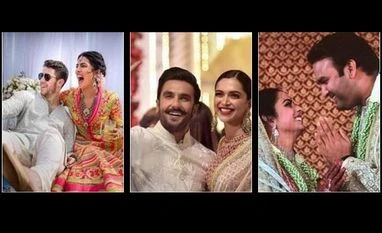'Tis the season to be jolly and perhaps also to be married or at least attend one of the many big fat Indian weddings, gilded with glitter and set to bhangra, disco and garba tunes to ensure guests dance the night away.
As the string of celebrity weddings -- Ranveer Singh-Deepika Padukone, Priyanka Chopra-Nick Jonas, Isha Ambani-Anand Piramal -- grab the headlines, the not so fancy ones clog up city roads with elaborate processions starring grooms on mares, ensconced inside luxury cars or riding a chariot.
And if there's a 'baraat', the band and the 'baaja' can't be too far behind.
"Wedding bands have evolved dramatically. It is no more a Punjabi 'dhol', two three instruments and one or two songs. Now we have themes," said Virender Chawla, managing director of the Chawla Band.
"For example, my band company offers 25 themes to customers to choose from Marwari, Punjabi, Rajasthani, western ... you name it and we will give you the package accordingly," Chawla told PTI.
Founded in 1973, Chawla Band, which claims to have worked in over 11 lakh weddings so far, has three branches in the capital to cater to the 'baraat', the groom's procession which is a part of many north Indian weddings.
The Chawla Band has featured in several Bollywood movies, including "Special 26" and the recently released Netflix film "Rajma Chawal", and has also been an official sponsors of the IPL team Delhi Capitals. The company also co-sponsored "Veere Di Wedding",
According to industry insiders, the starting price for bands is anywhere around Rs 20,000-40,000. The starting package includes a 'ghodi' (mare), 'dhol', lightings and a standard squad of about five band members.
More From This Section
Titarpur in west Delhi, well-known for its Ravan effigies during Dusshera, is one place to shop for wedding bands.
Both sides of the road in the locality, a supermarket of sorts wedding bands, glow with colourful fancy hoardings of professional bands on hire, all claiming to be more famous than the next in line.
One such company advertising its wares is the Sindhi Hira Nand Gohri Wala, which was established in 1950 and is famous for its "white" and "spotless" mare. It charges Rs 25,000 for its basic package but there is no upper limit, said Pankaj Sindhi from the company.
"Now, customers want 100 people for the band, a vintage buggy decked with flowers, firecrackers, fancy lighting, 'mashaals' and a hundred other things for decoration in the 'baraat'. Of course, this all costs more. The price is based on customer requirement," Sindhi said.
In these days of ostentation and bling, where weddings are important statements of status and wealth, the cost can hit stratospheric heights, the industry insiders said.
Chawla Band, which charges Rs 40,000 as its starting package, recently billed a client Rs 11 lakh.
"Money was just not the criterion for them. They wanted everything to be best in the wedding of their only son and we were happy to provide the same," said Prateek Chawla from Chawla Band.
Prateek, the son of MD Virender Chawla, showed videos from his iPad to show glimpses of the lavish procession.
"This could have been done in Rs 6-7 lakh also, but then it was a day when there were many weddings. So the cost went up," Prateek said.
With the money going up, band companies, who employ up to 700 people, have had to step up their operations.
Both, Pankaj and Prateek, millennials who joined the family business, said being "presentable" is the most important thing in the business these days.
"People now expect band members to be well-dressed with gloves and perfectly polished shoes. Earlier, everything was 'chalta hai', but that is just not the case now," he said, pointing to mannequins in his showroom wearing traditional and fancy dresses.
With teams of 500-700 people (permanent and temporary) this is not easy, they said.
But the trouble seems to be clearly worth it.
According to Pankaj, people are also very choosy about the songs to played in their wedding.
While tried and tested songs like "Mere yaar ki shaadi hai" and "Ghodi pe hoke sawar" are never out of demand, new additions have to be made to the playlist every wedding season.
So, newer songs like "Dil diyan gallan", "Bol halke halke" and "Rashke qamar" are much in demand this year as well.
"We do rehearsals regularly and try to improve with each and every song. But then the truth is that not all the songs can be played on the band," he added.
Companies also have to cater to quirky, out of the box demands from clients hoping their 'baraats' stand out.
"Recently there was this wedding where the groom said he doesn't want a horse, chariot or a vintage car for his 'baraat'. You know for what did he settled at last? An auto. So we did decorate one and he did made it to the wedding venue on an auto," Prateek recounted.
That said, the fear that this much celebrated band, baaja and baraat culture might not hold the same relevance in the future is evident.
While Prateek said that there was no way one can get "rid of it completely" with bands synonymous with weddings in many parts of the country, Pankaj admitted that business could go south.
"I guess the younger generation, people who are more literate and have studied abroad, think 'baraats' are about showing off and are not so interested any more.
)